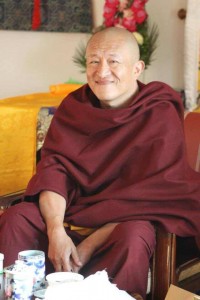
The future lies along the avenue where religious enlightenment meets personal freedom
Some years ago a young man chafing under what he imagined to be the restraining strictures of Buddhism posed the following question to His Holiness Dzongsar Jamyang Khyentse Rimpoche:
“Didn’t the Buddha say one should question and test every spiritual experience for oneself, and that nirvana is for everyone not just the select few?”
“Yes. And then?” said Khyentse Rimpoche, in his gentle and habitual way of drawing out the interrogator from his angst-ridden shell.
“Then why do we need to observe all these rituals?” blurted the anguished man. “Why all these rules about the correct or incorrect way to make an offering or wear your robes, indeed, even the rules about how to address a reincarnate such as yourself.”
The master’s eyes twinkled― everyone who knows Rimpoche knows he relishes the unconventional and irreverent moment.
“You’re probably right,” Rimpoche said. “Maybe we don’t need any of these rituals. You could also approach nirvana directly. But, I have to warn you that would be an extremely long and difficult path. These rituals and traditions provide form and shape, a container for your spiritual aspirations. For instance, imagine trying to cross a river without a boat. The observation of rituals and traditions gives you your boat. The boat will help you reach the opposite shore. On the other bank is where you will find awakened understanding which leads to enlightenment.”
Again the master’s eyes gleamed impishly, delighting in the punch line.
“You just have to remember to get off the boat when you get to the other side!”
Despite the levity, this was an exquisite teaching in the best traditions of Buddhism.
The question was heartfelt and fearless and the answer held within it Buddhism’s recognition of the power of free will tempered by respect for, not the rejection of, time-honored traditions and norms.
With democracy knocking on our door this is a lesson the Bhutanese population must take to heart as we strive to marry our venerable Buddhist traditions to the bride of governance by consensus.
The road, we know, is not without challenges.
The metaphorical shoes we have to fill are very large indeed and we cannot expect to replace a system overnight that has matured over centuries― from the Shabdrung to His Majesty’s enlightened leadership― without experiencing some growing pains.
For the new political system to truly work in a Bhutanese context free will must reaffirm, not undermine, the core values of Buddhism which have informed and enriched our cultural life. Buddhism, for its turn, must remain vigilant against the temptation to stray from its essentially secular and egalitarian nature.
As in any other marriage, real or figurative, only such a mutual and open reciprocity can make the relationship fruitful and sustained.
Fortunately for us, Buddhism believes in the central importance of allowing a multiplicity of views and expression, a prerequisite― some would say the very linchpin― of democracy.
To be truly useful, the Buddha said, religious instruction must speak directly to every single individual no matter what their views, training or experience.
The scriptures tell us the Buddha himself devised over 84,000 ways to teach the path because he understood that was the minimum required to address all the seekers who would come to Buddhism bearing the multifarious baggage of their personal conditioning.
“A practitioner’s view must be as vast as the sky and as solid as the earth”, he said. “It must be spacious enough to accommodate every sentient being in the universe.”
What, indeed, could be more democratic than that?
THE REAL HARMONY
“There are two ways of looking at rituals. On the one hand, rituals are an external expression of our inner state. And on the other hand, we strengthen and reinforce our inner state by these external actions. Of course, in reality there are not two things, but rather a unified whole. As we practice together sincerely, we become increasingly aware that such notions as internal and external cannot be separated. This awareness is actually the growing realization of the real harmony that underlies everything.”
– Taizan Maezumi in On Zen Practice

